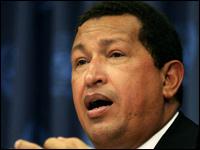Transcript
BOB GARFIELD:
For the Bush administration, the socialist revolution proclaimed by Venezuelan President Hugo Chavez has made him the hemisphere's public enemy number two, right behind Fidel Castro. Chavez's radical rhetoric, anti-Bush invective and increasingly authoritarian behavior have won him the suspicion of the American media as well.
As he began his third term this month, editorials in The New York Times, Washington Post and Los Angeles Times condemned his plans to nationalize huge private companies and, mainly, to not renew the license of the nation's most popular TV station, RCTV.
Chavez's former communications minister has referred to the move as "the leading edge of the information hegemony of the state," and RCTV says it has been denied due process. But to Larry Birns of the Liberal Council on Hemispheric Affairs, the underlying facts betray anti-Chavez editorializing as one-sided and simplistic.
LARRY BIRNS:
RCTV is arguably the most scabrous example of yellow journalism in Latin America. It's an advocacy outfit, and it was one of the major plotters of a coup against Chavez back in April of 2002. This station engaged in trick photography and all sort of scandalous behavior in order to advance that coup.
BOB GARFIELD:
Does not the principle of free speech, even of, you know, sort of obnoxious critics trump the history of RCTV's behavior? Is Chavez not setting a very bad precedent by silencing his most vocal critic?
LARRY BIRNS:
This is a situation where RCTV uniquely was shouting out the word "fire" in a crowded theater. Ninety-five percent of the media in Venezuela is controlled by the anti-Chavistas, and they have their knives out for Chavez. So talking about constitutional guarantees, you may be talking to the wrong bunch.
BOB GARFIELD:
Last month, Chavez was reelected in a landslide with 63 percent of the vote in an election with the highest voter turnout in Venezuelan history. Isn't that ample evidence that RCTV and anyone else in the right-wing media represent no great threat to his government?
LARRY BIRNS:
Well, perhaps at this moment, no. But if you are using lies, distortions, prevarications, at some point your influence may prevail.
BOB GARFIELD:
I want to ask you about what I referred to in the introduction, and that's the media coverage in the United States about Chavez's so-called Bolivarian Revolution. It's pretty close to being unanimous in denouncing Chavez's tactics, if not necessarily his goals.
These editorial boards are not populated by know-nothings. In your view, they've all gone wrong. Why do you suppose that is?
LARRY BIRNS:
Well, it was said of The New York Times that The New York Times will do everything for Latin America except visit it. It happens that most of the journalists, the correspondents give measured and fair and balanced treatment. But I do think that these editorials are simply scurrilous. It's basically an issue probably more of style than substance. I mean, Chavez is the kind of fellow that you don't find at Eton – bad instincts for public relations, bizarre antics.
But this is Chavez's playful style. That has nothing to do with the quality of his thinking and the proposals that he's made. He is not a cruel, heartless man. He is not a Pinochet. He's anything but a Pinochet.
BOB GARFIELD:
No, I don't think anybody on those editorial boards is worried that he's a Pinochet. I think they're worried that he's a Castro, and that the next shoe to drop will be a widespread attack on human rights, imprisoning of political prisoners, and whatever follows in the authoritarian slide down the slippery slope.
LARRY BIRNS:
There's your point. That's the point, because that's what they've got against Chavez. And if you look at the language used, it's always that Venezuela is becoming or the Chavez government will soon be. But the fact is that today Venezuela is none of those things.
It's important to realize, Bob, what's at stake in this whole Chavez business. Venezuela has always been a nominal democracy, a faux democracy, not a real democracy. And, in fact, the oil wells that started coming to Venezuela after the end of World War II, nothing ever went to the poor majority of the country.
Today, Venezuela is not only a formal democracy, a constitutional democracy, but it also is a real democracy in that people have the right to more than just starve. They also have the right to access to an education, to medical help and so forth. And that is why Chavez's support is actually increasing, much to the chagrin of the United States, which has come up with a new theory, which is free and fair elections aren't enough. It must be the quality of democracy we're talking about. They never talked about that before.
BOB GARFIELD:
Larry, thank you very much for joining us.
LARRY BIRNS:
Bob, it's been a pleasure.
BOB GARFIELD:
Larry Birns is the director of the Council on Hemispheric Affairs, a liberal think tank in Washington, DC.
